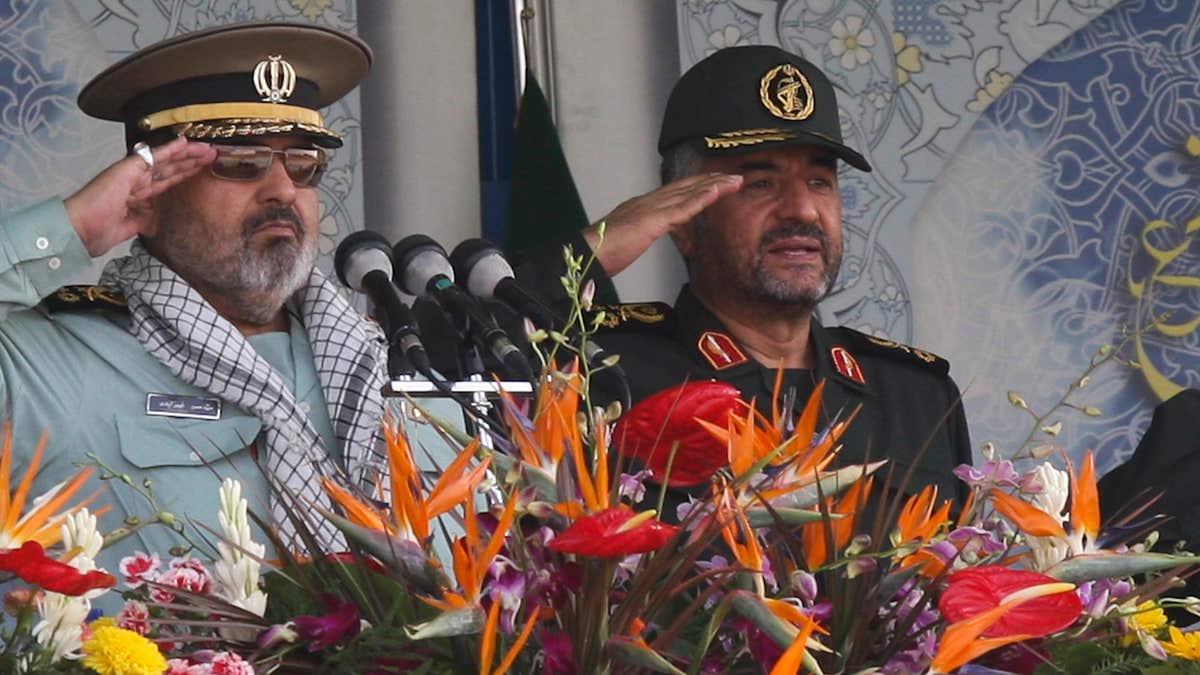
Sept. 22, 2011: Iran's Armed Forces Chief of Staff Hassan Firouzabadi (L) and Revolutionary guards commander Mohammad Ali Jafari salute during a parade to commemorate the anniversary of the Iran-Iraq war. (Reuters)
Iran’s military chief on Saturday backed the landmark nuclear deal with world powers despite having concerns over it, the IRNA news agency reported, a major endorsement that could allow Iranian conservatives to back an accord hard-liners oppose.
Gen. Hassan Firouzabadi, the chief of Iran’s armed forces and a close ally of Supreme Leader Ayatollah Ali Khamenei, spoke of 16 advantages of the deal in comments published by the news agency. Firouzabadi wrote that both a recent United Nations vote on the deal and the accord itself “have advantages that critics have ignored.
"The tone of the U.N. Security Council resolution has changed compared to the previous ones,” Firouzabadi told the Fars news agency, according to Reuters. “Regarding Iran's missile activities, it doesn't order but only asks for Iran's compliance."
But Firouzabadi also said Iran’s military has concerns about the deal.
"The Armed Forces have the most concerns about the impacts of the deal on Iran's defense capabilities and they are concerned about the US officials' misinterpretations from the post-nuclear deal sanctions," he added.
Khamenei, who has the final say on all state matters, has not publicly approved or disapproved the deal. However, he repeatedly has offered words of support for his country's nuclear negotiators.
Iranian parliament and the Supreme National Security Council, the country’s highest security decision-making body, are to consider the agreement in the coming days.
The July 14 deal between Iran and six world powers — the U.S., Britain, France, Russia, China and Germany — is meant to curb Tehran's nuclear program in exchange for lifting sanctions. Hard-liners have accused moderate President Hassan Rouhani and the country's nuclear negotiators of giving too many concessions in return for too little.
The report of Iran’s military chief backing the deal comes as President Barack Obama is lobbying both sides of Congress to support the accord. Obama dismissed the idea that he was “selling a fantasy” and added that those Iranian hardliners chanting “Death to America” don’t represent all of Iran.
"In fact, it's those hardliners who are most comfortable with the status quo," Obama said. "It's those hardliners chanting 'Death to America' who have been most opposed to the deal. They're making common cause with the Republican caucus."
Obama lost the support of some top Democrats last week. Democratic Sen. Chuck Schumer issued a lengthy statement announcing his opposition to the deal, which was followed by Rep. Eliot Engel, D-NY, the top Democrat on the House Foreign Affairs Committee announcing his disapproval of the deal.
Secretary of State John Kerry said he "profoundly" disagreed with Schumer and Engel’s decision to oppose the deal.
The White House is preparing for the likelihood that lawmakers will vote against the deal next month and is focusing its lobbying efforts on getting enough Democrats to sustain a presidential veto. Only one chamber of Congress is needed to sustain a veto and keep the deal in place.
Obama needs 146 Democrats in the House or 34 in the Senate to sustain a veto. As of Wednesday night, 16 House Democrats and 11 senators had publicly declared their support for the deal.
The White House has said it is confident it can sustain a veto at least in the House.
The Associated Press contributed to this report.
